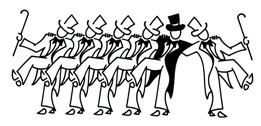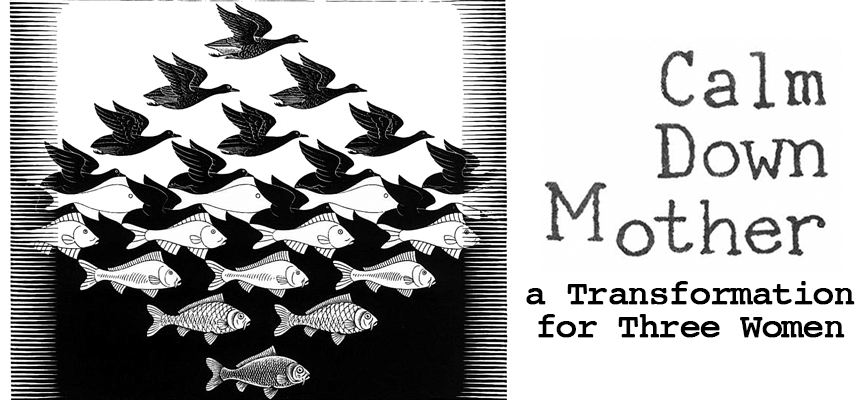At last year’s Elgin Fringe Festival, INDEPENDENT PLAYERS presented Eugene Ionesco’s The Bald Soprano, which was written in 1950 and was the first “absurdist” play. Once again at this year’s EFF, IP is stepping back into the past—1964—when it presents Calm Down Mother by Megan Terry whom leading drama scholar Helene Keyssar has referred to as “the mother of American feminist theater.” This “identification” is clearly evident based on the incredibly prolific body of dramatic work she produced from the 1960s to the 1990s. Calm Down Mother, written in 1964, premiered on a double bill with Keep Tightly Closed in a Cool Dry Place at the Sheridan Square Playhouse in 1965, and has become one of Terry’s most popular and most frequently anthologized plays.
The cast consists of Beth Hitzeroth-McDonald (of Hampshire), Lori Rohr (of Arlington Heights) and Dana Udelhoven (of Batavia), all of whom are seasoned and skilled actors and have performed with IP in recent seasons. The director is IP Artistic Director Don Haefliger. Performances will take place at IMAGO, 216 Prairie Street, Elgin. Performance days and times are: Friday, September 16 at 7:30 PM, Saturday, September 17 at 3:00 PM and Sunday September 18 at 12:00 Noon. Tickets are $5 and can be purchased at EFF Central located at Side Street Studio, 15 Ziegler Court, Elgin (just two blocks north of Imago).
In the course of approximately thirty-five minutes, three women each play nine different characters. They achieve this through the theatrical device known as “transformation,” Megan Terry’s most important contribution to theatre. Set on an open stage with only four chairs, each scene “transforms”—at times abruptly, sometimes with the help of bridging commentary or ritual chant—into other scenes in other locales. This play depicts vignettes of women’s daily lives and shows how interactions between women are structured by their familial or societal relationships, economic status, ages, professions or occupations, and above all, gender. The simplicity of the scene allows the actors to create various social and cultural milieus through their use of movement, posture, and voice and through their ability to transform themselves from identity to identity. All of this actually draws the audience in to participate actively in the creation of the illusion onstage.
Terry fell in love with theater at the age of seven, and became a member of the Seattle Repertory Playhouse during her senior year in high school. The liberal politics and activist attitudes of the company’s directors influenced her views of theatre in society and she credits the closure of the SRP under pressure from the House Un-American Activities Committee for her later use of biting political commentary on stage. She remained in Seattle for the next five years where she faced backlash for the racy themes and edgy approach of her earliest plays and finally moved to New York in 1956 where she continued to write plays which deal with social and political issues and worked as an actress in television serials. She began to form connections in the theatre community, among them playwright Maria Irene Fornes and director Joseph Chaikin who were working with The Living Theatre. With Peter Feldman and Barbara Vann they founded The Open Theatre in 1963, a theater co-operative which progressed from a closed experimental laboratory to a performance ensemble. The type of theatre, which was embraced by the Open Theater, grew out of the worldwide collective theatre movement of the 1960s, and was further inspired by the theories of the acting teacher Nola Chilton and Chicago artist and innovator of “theatre games,” Viola Spolin.
Repeatedly, she has dramatized women’s issues: gender stereotyping, reproduction, patriarchal language, woman as victim, woman as hero, competition and sisterhood, the bonds and separations between mothers and daughters, and the perils of male-female relationships. Her treatment of these themes is part of her continuing focus on the societal forces that define women, the cultural icons that provide women with negative self-images, and the political barriers that prevent one from discovering who she is and what she can be.
“IP is delighted to have the opportunity to perform Calm Down Mother at the Elgin Fringe Festival because it is such a seminal play in the development of modern American theatre as it has developed since the 1960s.” says Don Haefliger, IP Artistic Director. “Ms. Terry is also remembered for writing Viet Rock, the first rock musical, in 1966 which was a landmark production for both The Open Theatre and Ms. Terry herself—it was the first play to address America’s involvement in Vietnam. Gerome Ragni, one of the production’s leading actor borrowed her anti-war theme, improvisational techniques and rock-and roll aesthetic to create the blockbuster musical Hair with fellow actor James Rado (and who hasn’t heard of Hair !). It was highly praised by Richard Schechner who described it as ‘Elizabethan in scope and compared the technique used by The Open Theater to that of Shakespeare’. Having seen it, what it says about war is, in my opinion, totally apropos in today’s world of war and terror; see it if you ever get a chance—perhaps sometime at IP?! (who knows?)”


